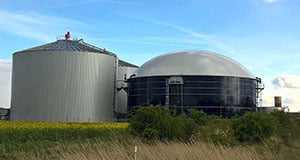New opportunities have risen for recycling companies in the UK. In the Waste Resourses Action Plan, published in early 2019, the UK government shows their support for the improvement of the waste processing infrastructure, specifically leaning towards renewable energy and anaerobic digestion.
Improving the waste infrastructure of the UK
Front runners in the UK was te sector have responded with optimism to the new government approach, which will create better circumstances to process local waste streams into various resources. In an article by the Environment analyst, the chief technology and innovations officer of Veolia, Richard Kirkman expresses the company's commitment to the UK waste challenge. Having opened two new recycling plants in the last year, they aim to help build the necessary infrastructure.
te sector have responded with optimism to the new government approach, which will create better circumstances to process local waste streams into various resources. In an article by the Environment analyst, the chief technology and innovations officer of Veolia, Richard Kirkman expresses the company's commitment to the UK waste challenge. Having opened two new recycling plants in the last year, they aim to help build the necessary infrastructure.
Contamination of MSW as a cause for incineration
Even with recycling numbers slowly improving, 2019 statistics on UK waste show that less than half of household waste is currently recycled. According to an article by inews, a large part of waste is disposed of through incineration. They mention a doubling in the amount of incineration plants over the next decade, expecting over 50% of the nation's waste will soon be disposed of in this way. As non-treated MSW loads can be deemed too contaminated for processing, some municipalities may burn up to 80% of their residual waste, together with all the valuable organic materials it may yield. These organics could very well be used for the generation of bio fuels, but are simply burned. Additionally, often carrying moisture, the organics require additional energy to maintain temperatures in the incinerator.
Pre-treating MSW to enable renewable energy from waste
With a new government focus on building an infrastructure for renewable energy, a cost effective method to pre-treat waste for biogas can lend recycling companies a strong business case. Additionally it will make life easier for both businesses as well as households. Quick and effective techniques to separate organic from inorganic material can leverage gas yield and overall costs.
One of the potential pre-treatment methods is hydraulic press technology. Under high pressure, equipment can separate the wet organic material from the dry inorganics such as plastics and paper. This way the organic fraction can be easily sent to AD and the dry, high calorific fraction, will require less energy to be incinerated or can be further upcycled. Additionally, breaking the cell walls of the organic material under high pressure, the material will more quickly digest, enabling up to 30% more biogas potential.
With a cost effective method to isolate and use the organics in household waste, the UK will be able to stay clear of unnecesary incineration of organics and more easily strengthen its infrastructure around renewable energy from food waste. Overall, the Waste and resources plan is looking like a great incentive to lead the UK into the right direction on this topic and will further promote the circular economy.
Interested in learning more about waste separation and pre-treatment technology?
 or check out our page on separating MSW.
or check out our page on separating MSW.
